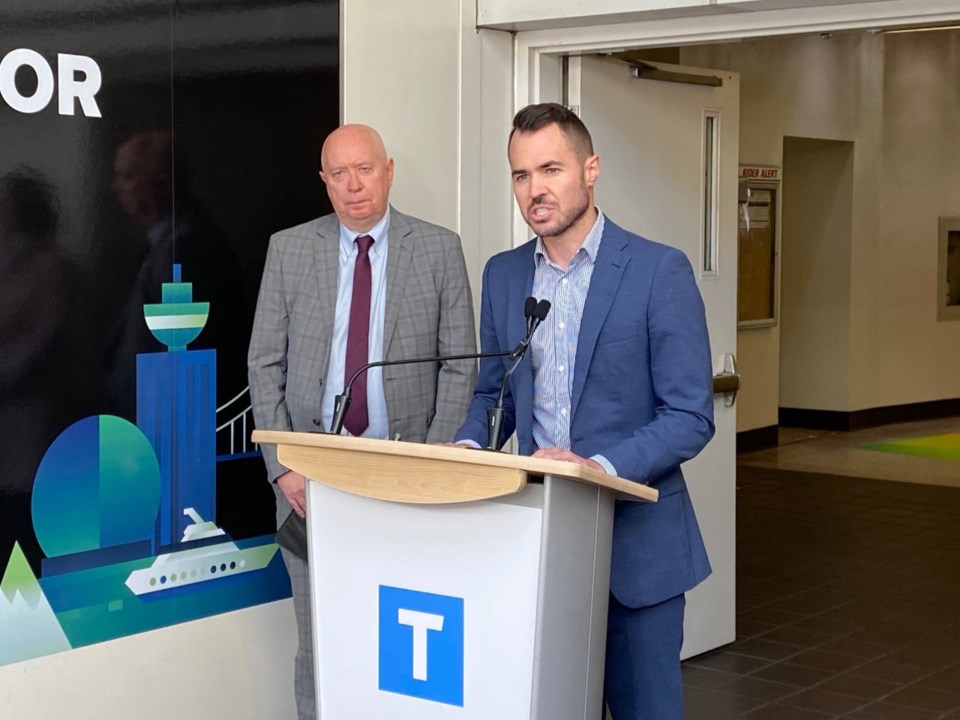Metro Vancouver mayors are touting a new report they commissioned indicating looming transit cuts will cost the average household in the region $1,000 per year.
The Mayors’ Council says TransLink, the region's transportation authority, will face a fiscal cliff of $600 million in 2026 if provincial and federal governments don’t step up with more sustained funding to not only maintain existing service but also grow and improve it.
“The impacts to our communities from losing transit service is shocking, and anyone who is running to be the premier of this province needs to be paying attention,” said Mayor Brad West, chair of the Mayors’ Council, via a news release.
“It is absolutely clear that reducing transit services is unacceptable, especially at a time when so many people are facing higher costs of living, longer commutes due to traffic congestion and challenges finding affordable housing. Voters in Metro Vancouver deserve to know what the provincial political parties will do to avoid these impacts,” said West, alluding to the Oct. 19 provincial election.
The report by InterVISTAS Consulting Inc. tabled at Thursday’s monthly Mayors’ Council meeting claims there will be fewer jobs near transit, resulting in a cumulative net loss of job accessibility and consumer goods will cost more due to longer delivery times, as a result of greater congestion.
The biggest annual cost will be people spending more on transportation by either purchasing a car or using more expensive alternatives.
The report factors in matters such as an increase in people being charged late pickup fees at daycares and foregoing activities.
The report cited a study conducted for the Chicago Transit Authority, which found that for every $1 invested in transit, $13 are generated in economic activity and travel time savings in the Chicago region. It states in Metro Vancouver that figure would be closer to $7.70 in savings for every dollar invested.
Last June, TransLink CEO Kevin Quinn announced $90 million in internal cost-cutting measures, according to a June 27 Ernst & Young LLP efficiency review report from Olga Kuznetsova, vice-president of financial services.
“As CEO, I’m committed to the highest level of transparency,” said Quinn in July.
TransLink executives earn some of the highest salaries in North America, with Quinn being paid $507,636 for his role, according to this year’s legislated sunshine list — the 2023 Financial Information Act Filing and Remuneration Report.
Last year’s budget shows TransLink’s total expenses were $2.15 billion, with $945 million going to bus operations, and $405 million to rail operations among the largest expenses. TransLink brought in $978 million in taxation revenue and $671 million in transit fare revenue, among chief revenue streams. The agency ran a balanced budget and is expected to utilize $478.9 million in one-time provincial government relief to cover increased expenses until December 2025.
By comparison, Seattle’s Sound Transit operates a US$3.1-billion budget and pays its CEO US$375,000.
In 2019, politicians on the Mayors’ Council were paid $262,404 by taxpayers in meeting fees, after 11 regular (monthly) meetings. Fast forward four years, in 2023, the politicians approved $471,010 in salaries for themselves, a 79 per cent increase. In 2023, only nine regular meetings were held by the council. In that same period, council expenses nearly tripled, from $12,555 to $33,358.
West has noted that the increase in fees accounts for non-regular meetings and the fee schedule is set to the Consumer Price Index.
Meanwhile, TransLink and the provincial government are in the midst of major infrastructure projects, the largest being the Broadway Subway expansion.
Despite the subway line being hit with significant delays, the BC NDP government maintains it is on budget, although it has not provided an actual budget update since the latest delays were announced.
Correction: An earlier version of this story incorrectly stated transit cuts would cost $1,000 per resident annually. It is in fact, per household.




